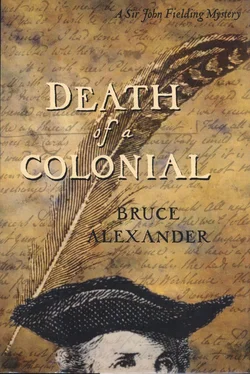Bruce Alexander - Death of a Colonial
Здесь есть возможность читать онлайн «Bruce Alexander - Death of a Colonial» весь текст электронной книги совершенно бесплатно (целиком полную версию без сокращений). В некоторых случаях можно слушать аудио, скачать через торрент в формате fb2 и присутствует краткое содержание. Год выпуска: 1999, ISBN: 1999, Издательство: Putnam Adult, Жанр: Исторический детектив, на английском языке. Описание произведения, (предисловие) а так же отзывы посетителей доступны на портале библиотеки ЛибКат.
- Название:Death of a Colonial
- Автор:
- Издательство:Putnam Adult
- Жанр:
- Год:1999
- ISBN:9780425177020
- Рейтинг книги:3 / 5. Голосов: 1
-
Избранное:Добавить в избранное
- Отзывы:
-
Ваша оценка:
- 60
- 1
- 2
- 3
- 4
- 5
Death of a Colonial: краткое содержание, описание и аннотация
Предлагаем к чтению аннотацию, описание, краткое содержание или предисловие (зависит от того, что написал сам автор книги «Death of a Colonial»). Если вы не нашли необходимую информацию о книге — напишите в комментариях, мы постараемся отыскать её.
Death of a Colonial — читать онлайн бесплатно полную книгу (весь текст) целиком
Ниже представлен текст книги, разбитый по страницам. Система сохранения места последней прочитанной страницы, позволяет с удобством читать онлайн бесплатно книгу «Death of a Colonial», без необходимости каждый раз заново искать на чём Вы остановились. Поставьте закладку, и сможете в любой момент перейти на страницу, на которой закончили чтение.
Интервал:
Закладка:
“Mobley, is it?” said the magistrate. “Mr. Marsden, do you have record of any Percival Mobley?”
The court clerk made a great show of searching through the papers on the table before him. At last, prefacing his response with a sigh, he said, “No, sir, I daresay I do not.”
“Why, there must be something.” Then, addressing the man before him: “You made a confession last night, did you not?”
“No, sir, I made a statement.”
“A nice distinction, yet hardly worthy of recognition. Did you make it as Lawrence Paltrow, or as — what was the name?”
“Percival Mobley — and, yes, that was, of course, the name under which I made my statement, for that is my rightful name.”
“Mr. Marsden, you say there is nothing there before you under that name?”
“Mobley? No, as I said, nothing under that name, Sir John.”
“Nor Paltrow?”
“Nothing here, neither.”
“Well, then, sir,” said the magistrate to Mr. Mobley, “how do you account for that?”
“I know not. I have made my statement, and that is that.”
“Not quite so quick. Were you or were you not marked down in the register of the Globe and Anchor as Lawrence Paltrow? “
“I have said as much.”
“But…”
Round and round they went. It was all nonsense, of course. I had listened as they planned it all together the night before. Mr. Donnelly, doctor and surgeon and medical examiner for the Westminster coroner, bandaged and plastered Mr. Mobley and brought him to some semblance of good repair. By the time he had completed his ministrations, he, too, had joined in with a few suggestions of his own.
“What you must do,” he urged, “is to mention the statement as often as possible, so that one cannot come away from the court ignorant of its existence, nor without wondering what riches it might contain.”
“Just so,” said Mr. Mobley.
“I shall acquaint Mr. Marsden with our little show,” said Sir John, “and he will be eager to play a part. He dearly loves such mummery.”
Pleased as they were with the planning, they were not thus occupied for their own entertainment. For as had been intended, I went out next morning to Fleet Street and Grub Street to offer Sir John’s invitation to the editors of a number of newspapers, which promised intriguing revelations of interest to their readers if they were to send a representative to the Bow Street Court for that day’s session. Since Sir John was not known to be one who puffed the sessions of his court, as indeed certain magistrates were known to do, three editors — those of The Public Advertiser, The Morning Chronicle, and The Times — sent representatives to the proceedings. I sat as close to them as possible (for, as journalists do, they huddled together) and was afterward pleased to tell Sir John that the response of the gentlemen of the press was exactly as hoped: At first confused, they became greatly interested when the existence of Mr. Mobley’s statement became known. Why had he signed into the hostelry as Lawrence Paltrow? Was it true, as had been rumored, that the brother of Arthur Paltrow had been preparing a claim upon the Laningham title and fortune? In insisting that he be addressed as Percival Mobley, was he now admitting that he had been preparing a false claim? These and a number of other such questions were exchanged by them at the end of the little comedy played out between Sir John and Mr. Mobley. (Sir John ruled at last that the gentleman with two names might be charged under both of them.) The journalists were still talking heatedly among themselves as the courtroom emptied.
All this I reported to Sir John, and though he was greatly pleased, he set me to the next task, which was to make a fair copy of Mr. Mobley’s statement of the night before and label it as such.
“For,” said he, ‘you may be certain that Sir Patrick had one of his spies present, and it should not be long until we hear from the Solicitor-General direct or through an emissary.”
As usual, he was correct in his assumption. Yet because I set to work upon it straightaway, I had finished the copy and had it ready by the time the young lawyer from the office of the Solicitor-General arrived with a formal written request for Mobley’s statement. In his presence I read the request aloud to Sir John, who made a proper show of resistance. He stormed and huffed a bit and declared that the Solicitor-General had no right, et cetera, but in the end he instructed me to fetch the statement from Mr. Marsden and deliver it to him. I made as if to do as he instructed, wandered about a bit, and then returned to hand it over to Sir John. (It had been folded and tucked away in the pocket of my coat all along.)
“I wish this to be sealed,” said he to me in his most solemn manner. “I want no meddling done by this message-bearer nor anyone else.”
“Sir,” said the young lawyer, “I would do nothing of the kind.”
“No doubt you would not, yet in this way I may also make plain to Sir Patrick that I surrender this to him only under duress.”
Then I hastily melted the wax, allowed it to drip upon the paper, and pressed Sir John’s signet ring firmly into the warm, wet seal. He ordered me to hand it over to the young man, and I did so with a face as solemn as his own.
The fellow was barely out of earshot — if that — when the magistrate pulled me close and said in a voice louder than need be that I had better bring the original to Lord Mansfield, lest I make a liar of him — that is, Sir John.
“How do you mean that, sir?” I was quite puzzled by what he had said.
“1 mean that in an hour or, more likely, less than that, either the young man who just paid us a visit, or perhaps even the Solicitor-General himself, will return and demand the original. I shall be quite sympathetic but not, ultimately, very helpful, for I shall inform him that the original has been supplied to the Lord Chief Justice at his request.”
“Did he request it?”
“Well… no. That is perhaps a bit of an exaggeration on my part. Perhaps I had better not add that.” He grinned rather boyishly at having been caught out. “I shall assure Sir Patrick that the copy provided him is in every way the same as the original. It is, isn’t it, Jeremy?”
“Oh, yes, sir — all except ‘Fair Copy,’ which was writ across the top.
“Well, then, you can see why it is important that we get the original to Lord Mansfield, for if we do not, then I am a liar — and that is not how I wish to look upon myself. “
And so I made ready to go to the great house in Bloomsbury Square. Just before leaving, I was surprised when Sir John ordered me to wear a brace of pistols for my trip across the city. It was not near dark; nevertheless, he seemed to fear that I might be robbed on the way.
“I want no one to look upon that document you carry except Lord Mansfield. If you should be stopped, threaten to shoot dead him who stops you. But if one should move against you, or otherwise detain you, don’t shoot him dead. You may, however, shoot to wound. The leg, I believe, is the best place.”
This was indeed sobering. He had never, in my memory, described circumstances in which I might discharge a pistol at another human being.
Therefore, I made the journey to Bloomsbury Square in a most watchful state, always aware of the near weightless burden that I carried in my right coat pocket. The statement, read and signed by Percival Mobley, which filled near four pages of foolscap, was accompanied by a note from the magistrate dictated hastily as an afterthought. All were folded together letter-style, sealed, and stamped with the impression of Sir Johns signet ring. The pistols were belted over the coat in such a way that the holsters in which they sat were fixed tight over the coat pockets; it would have been quite impossible for any pickpocket, no matter how light-fingered, to have thrust his hand inside and come away with the documents I carried.
Читать дальшеИнтервал:
Закладка:
Похожие книги на «Death of a Colonial»
Представляем Вашему вниманию похожие книги на «Death of a Colonial» списком для выбора. Мы отобрали схожую по названию и смыслу литературу в надежде предоставить читателям больше вариантов отыскать новые, интересные, ещё непрочитанные произведения.
Обсуждение, отзывы о книге «Death of a Colonial» и просто собственные мнения читателей. Оставьте ваши комментарии, напишите, что Вы думаете о произведении, его смысле или главных героях. Укажите что конкретно понравилось, а что нет, и почему Вы так считаете.












